|
ColePowered
|
 |
« on: April 23, 2018, 12:33:43 AM » |
|
Shadows of Doubt is a detective stealth game set in a fully-simulated sci-fi city! There’s been a murder and it’s up to you to solve it by any means necessary, with the condition that you keep a low profile. A unique mix of procedural generation and hand-crafted design enables every room of every building to be explored. Citizens go about their lives independent of the player as you watch from the Shadows, in search of crucial information. DESCRIPTION An open world stealth game with a whole city of secrets at your fingertips! Set in an alternate reality hyper-industrialized 1980s where the government outsources police work to private corporations and contractors. You play the role of a private intelligence investigator, making money by finding and selling information. Capture of the rampant serial killer carries a hefty bounty, but who knows what secrets you’ll find along the way. In this world of secrets & lies, information is power, and the cards you hold are determined by how far you’ll go to acquire it… Break into apartments, rifle through secret documents and hack security systems. The entire world is fully simulated. Each citizen has an apartment, a job, a daily routine, favorite things to do, places to go, and people to interact with. Uncover this knowledge and use it to your advantage! - Every room in the entire city is able to be explored. Lose yourself in an incredibly detailed sci-fi/noir world.
- Open-ended gameplay: How you achieve your objective is up to you.
- Powerful procedural generation will mean your city, it’s buildings, addresses and citizens will be completely unique to your game experience.
- Events unfold as a result of interaction between the AI citizens. The killer could be anyone, hiding anywhere.
- Locking-picking, hacking, sneaking, climbing. Level up your skills and become a master of stealth.
Pre-Alpha Gameplay
Project Stage: Pre-AlphaFurther Information:Development Updates: |
|
|
|
« Last Edit: October 14, 2022, 07:04:54 AM by ColePowered »
|
 Logged
Logged
|
|
|
|
|
Tusky
|
 |
« Reply #1 on: April 23, 2018, 07:24:42 AM » |
|
What a great idea. Look forward to hearing how you progress with this!  Do you know at this point if you will have a story mode or campaign? Or will it be more like increasingly involved / tricky cases to solve. |
|
|
|
|
 Logged
Logged
|
|
|
|
|
ColePowered
|
 |
« Reply #2 on: April 23, 2018, 08:51:00 AM » |
|
Thanks  A very loose story- comprised of different killer AI. So the general themes of cases may be the same or very similar, but because it's AI-driven it will be completely your own experience. The campaign game will be like the story of your career, with each case/AI acting as a chapter. |
|
|
|
|
 Logged
Logged
|
|
|
|
|
ColePowered
|
 |
« Reply #3 on: June 18, 2018, 03:37:12 AM » |
|
Hi all! In this 2nd development blog installment, I'm going to talk about the project's development during the past year or so; the problems, how I've overcome some and am still battling others. Truth is the development of this game so far has been tough. With most games you can develop mechanics and test them in a reasonable amount of time, from there you can start to hone and adjust until you have something playable. At this stage, you can be reasonably comfortable in what you have and proceed to add art, sound etc. With Concrete Jungle I had a pretty good prototype ready in a matter of months (admittedly after a long time trying different ideas), and something representing the final game quite accurately by the time I did the Kickstarter. Shadows of Doubt has been much harder to develop because the entire premise of the gameplay hinges heavily on the integration of procedural systems. In order for the game to function as intended I need: 1) A whole city of citizens to play out their simulated lives. The game needs ways of 'recording' what happens, so the player can uncover evidence at a later date. I've got in-depth plans for this. The big one to tackle first being citizen memories/eyewitness accounts - who's seen who, when, and where. This is actually a huge amount of data for the game to process, as it needs to record everything. 99% of the stuff it's recording will never be seen by the player because chances are they have absolutely no reason to question Mrs Rogers, 83, living at Sycamore Terrace with her cat Percy. There's probably no reason to uncover her credit card accounts or rifle through her trash. But the game needs to simulate it anyway because it's all about open-ended possibility. There's that famous 3D open-world game notion; if you see a mountain in the distance, you can go there in person. In Shadows of Doubt, if you see a person in the distance you can go dig up a mountain of information on them. 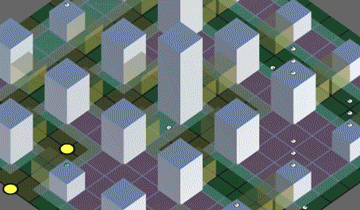 The citizen simulation aspect of the game is working to a decent standard (this has been a large chunk of development time). The citizen simulation aspect of the game is working to a decent standard (this has been a large chunk of development time). -preferably with some kind of motive. They need to have some evasive ability (ie lie to cover up where they were should they be questioned). Right now nobody lies, so if you happen to question the killer, they're like "oh yeah I was there, I totally killed them". 3) A simulated citizen to find the body and report it. This one is pretty self-explanatory. Its initial implementation is basic and works about 75% of the time- because right now it's possible that a killer will kill someone living alone (sorry Mrs Rogers), and nobody will ever find the body. In earlier builds, I overlooked that the killer could 'find' the body, which resulted in them reporting the crime as soon as they'd killed them. Combined with the inability to lie, this made for one very easy detective game! 4) It needs at least a semi-functioning management system where you can assign detective teams. This is where the player's decision making starts to surface. 5) It needs an orders system which allows the player to interact with the world and the citizens. Eg. Questioning to see who a citizen has seen recently, where and when. Basically a way of gathering information, as well as other resources. 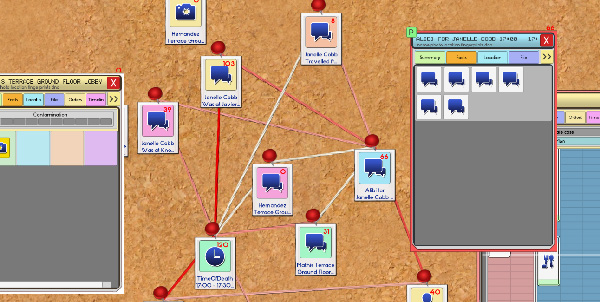 The classic evidence & string interface makes an appearance-- just like in real life, it's the best way to visualize connections. At the moment it's a bit overly-complex and messy-- it needs streamlining. The classic evidence & string interface makes an appearance-- just like in real life, it's the best way to visualize connections. At the moment it's a bit overly-complex and messy-- it needs streamlining. This is something I've had to learn about through trial and error in previous game development adventures. Choosing who to question next doesn't mean anything if you can just question as many people as possible with no consequences. Introducing constraints is the key to making those decisions mean something. The core one is time; citizens' memories are constantly getting fuzzier, and public opinion may turn against you if the killer strikes again. 7) It needs a compelling hook to keep the player playing. In this case a progression system. Usually, the progression will work to ease the above constraints in some fashion, but in a way that makes progress feel real when in actual fact it's more or less in-line with the game's difficulty curve, giving somewhat of an equilibrium effect. 8 ) There needs to be peril. This is somewhat of a personal preference, but in most of my favourite games, there is always something important to the player at stake. Usually a risk of death of one or more characters that the player has been working hard to progress. In a game about catching murderers, it makes sense to have that risk of your agents dying- but the implementation is tricky since you aren't directly controlling any combat/dangerous scenarios. One of my first instincts early in development was to have an 'apprehend' stage of the game where the aim was to capture the suspect- perhaps via a turn-based tactics minigame or similar. While that would be really cool, I feel like this is too big a commitment for an already ambitious project, so I'm going to have to find an alternate solution. I'm not sure what yet. Maybe the threat of citizens being murdered is enough. What I absolutely don't want is have a risk of losing an agent without any input from the player- there's nothing more infuriating than losing a favourite character because of RNG. Once I have all of the above functioning, I have my game. It's probably a bit naive for me to think this is as challenging as game development gets, but it sure feels like it! It's #7 that's got me thinking recently- is the real hook of this game going to be the management-style progress system? Or is the hook simply the emergent story of the cases and 'whodunnit'? Is it both? The plan was always the former, partly because even though procedural generation fascinates me to no end, I was not confident enough in it (arguably my implementation of it) to depend on it to tell compelling stories. Ideally, you'd still have fun managing your department even if some of your cases are super straight-forward and have no twists and turns. It's still my plan to depend more heavily on the tried-and-tested mechanics of the management genre for the core experience, but as the emergent cases have been occupying so much of my time it's impossible not to at least hope that they will add a lot to the experience. We'll have to see. Despite the above sounding probably way-too-ambitious for a small team, yet alone a sole developer, I'm having so much fun making this game! It is slowly getting there-- at a snail's pace, but it's still going to take a little while longer before I'm truly glimpsing the light at the end of the tunnel in terms of playability. It's more like everything is slowly coming into focus. Til next time. |
|
|
|
|
 Logged
Logged
|
|
|
|
|
PetSkull
|
 |
« Reply #4 on: June 18, 2018, 04:00:52 AM » |
|
This sounds very ambitious and a clever idea. I love procedural gen and AI myself, so I can feel your enthusiasm  - I'll lurk and see where this is going! |
|
|
|
|
 Logged
Logged
|
|
|
|
|
ColePowered
|
 |
« Reply #5 on: June 23, 2018, 05:59:38 AM » |
|
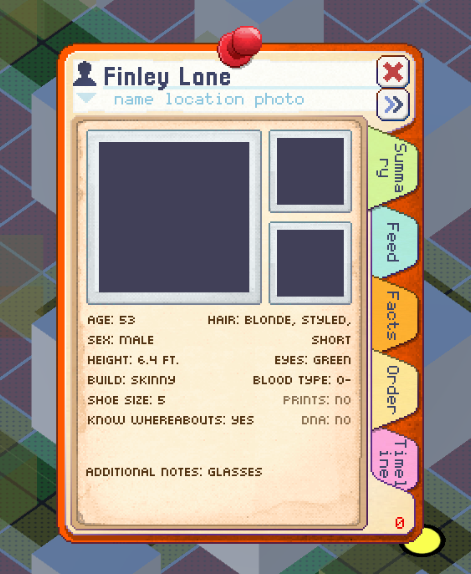 I have a bug in the game right now that makes everybody have tiny feet. Easily correctable, but I'll leave it in right now because it's far more amusing to picture 6ft 4 guys walking around with tiny dainty ballerina feet  . |
|
|
|
|
 Logged
Logged
|
|
|
|
|
ColePowered
|
 |
« Reply #6 on: June 25, 2018, 04:19:42 AM » |
|
For the art style, I'm going with pixel art for 2D interface graphics, mixed with voxel style 3D buildings and 2D sprite characters. I've always been fond of the pixel art style, the interface reminds me of the management genre's golden age in the 90s (memories of Bullfrog games spring to mind). One fear, however, is that it's not an ideal fit for the amount of information I need to display on screen- it's a fine balance I'm going to have to get right. 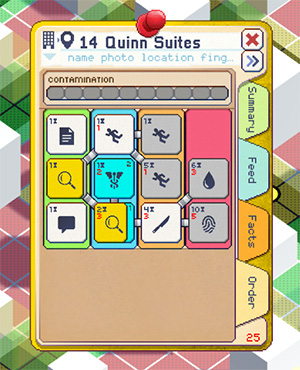 This is my first time designing pixel art UI, and adjusting to the size/scaling restrictions has taken some patience! This is my first time designing pixel art UI, and adjusting to the size/scaling restrictions has taken some patience!
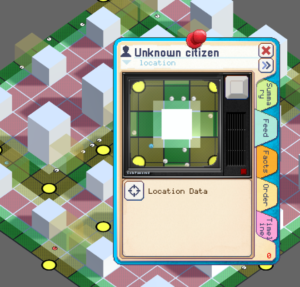 I've been mulling over a new fascinating inclusion to the game. A lot of the game involves time passing, although an essential resource, there are periods where there's not really much for the player to do (while waiting on those lab results, etc). This is typical of the genre and isn't really an issue because similar games will just speed up time by several factors and pause when something interesting happens (eg. XCOM). This is what happens in Shadows of Doubt at the moment, and it's absolutely fine. BUT... Currently, there are isometric and top-down view options only. I'm going to have to make the game pretty anyway, and the 3D city is right there, with all the citizens in their simulated glory. Why not just let the player walk the streets in those phases of 'time passing'? All it would need really is a basic FPS controller. I think being able to walk the streets could add a real connection to the city and its population. How cool would it be to spend your time waiting reading the morning's newspaper in the greasy spoon across the street over coffee? Or staring out your rainy office window overlooking the city while you wait for your agents to perform an interrogation of the prime suspect. There's something irresistibly noir about that, and I'm going to have to pursue it to some degree. Especially since the game already requires a lot of those assets to be suitably detailed and constructed in 3D anyway. I'm not talking copious amounts of detail here by the way. What I'm picturing is noir pixel art style 3D similar to explore 'em up game Bernband. Trouble is this is a potential huge rabbit hole in an already-ambitious project. Where do you stop? If you can do this, why not just let you go to the crime scenes and do everything yourself like a true first-person detective game? As awesome as that sounds, the line will have to be drawn in the sand somewhere. At the moment, the first person element is purely going to be an optional 'time waster' element that lets you feel more immersed in the game world. It's going to be a challenge of course to create this world. At the moment the city is procedurally generated using a semi-but-not-overly complex system involving building density and zoning. For now I shall iterate on that generation, but later on, I'm leaning towards having the city as more of a designed element of the game. A city level editor at a later date would be a great inclusion, opening the game up to user-created cities, while keeping procedural cities as an option to the player. I'm going to be pursuing that 'optional' design philosophy throughout the game. For example, all documents will also be procedurally generated and there for the player to read if they want to- but they don't have to. The useful bits of information are summed up in a handy list-style subsection, and represented by visual icons (think if somebody has summed something up via bullet points). It's really easy and digestible for the player-- especially since the icons can link to another bit of evidence. Mouse over them and they'll tell you the fact; "Joe Burns lives at 3 Cedar Drive". Click on it and it'll bring up the file for Cedar Drive (or Joe Burns if you are clicking on it from the Cedar Drive file window). But the extra detail is there for those that really want to get lost in the case- you can read the rental agreement between Joe and his shady landlord that the 'fact' came from. I love games like Deus Ex and The Elder Scrolls games where, if you want to, you can spend hours reading books- or more typically notes and other forms of interaction between NPCs. The love of those moments is one of the reasons I decided on this idea as my next project, and I plan to fill Shadows of Doubt with the same kind of detail. |
|
|
|
|
 Logged
Logged
|
|
|
|
|
ColePowered
|
 |
« Reply #7 on: July 02, 2018, 09:10:18 AM » |
|
Last week I switched over to making some art as I was getting slightly frustrated with the coding- not because it was going badly, but because without graphics the game feels like it wasn't progressing. I needed that change of pace, and seeing the visuals start to come together a bit has given me some more confidence in the project. 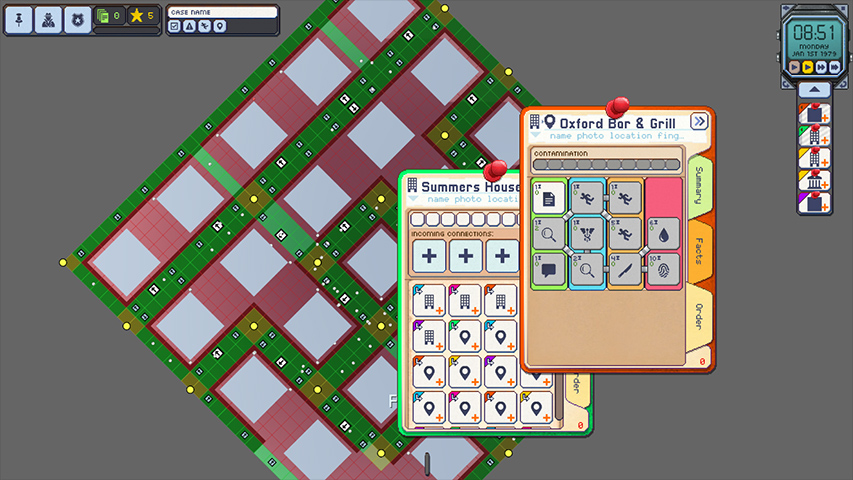 I'm trying to keep the UI as minimalist as possible. In this initial design, I've managed to fit in all essential display elements into 2 compact but not overcrowded spaces. The more room the player has to browse those case files the better! I'm trying to keep the UI as minimalist as possible. In this initial design, I've managed to fit in all essential display elements into 2 compact but not overcrowded spaces. The more room the player has to browse those case files the better!Selecting fonts has been interesting- since I'm working with bitmap pixel art fonts on this project, I can't scale them properly without them looking awful. Therefore I've had to stick to 1x, 2x or more their designed size in order for the pixels to remain consistent sizes. It's not a design challenge I had prepared for, but with some extra time and attention, I've managed to find some great fonts that are the size I need and most importantly remain clear. Font artists who provide affordable or even free fonts for commercial use are the unsung heroes of game development! A big thank you to Zacchary-Dempsey-Plante, Yusuke Kamiyamane, 'NAL' and Chase Babb for the fonts I'm using here. I'm taking a skeuomorphic approach to the interface design- that is the elements look like their real-world counterparts. For example, the evidence information windows look like case files, the clock in the corner of the screen looks like a retro digital watch (the game takes place in the late 70s through to 90s) and the corkboard interface looks like, well, a corkboard. Many games feature this design style, the one that springs to mind off the top of my head being Papers Please. I tried to touch a little on this in Concrete Jungle too- my games tend to be interface heavy, so why not make the interface as fun to use as possible? It's the attention to detail that can go a long way- especially in combination with satisfying sound design (eg. rustles of paper, or the 'stamp' sound when you purchased a new card in Concrete Jungle). A good UI the player will never really notice because ideally, it presents no barrier to interaction and immersion with the game. 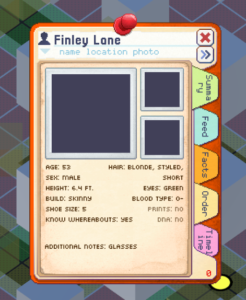 The game uses a pseudo windows interface- the evidence is presented in windows that can be moved, resized, minimized and pinned to a case cork board (which acts like the windows desktop). Just the presence of a small 'X' in the top corner gives the player feedback this is an interface they are familiar with. The game uses a pseudo windows interface- the evidence is presented in windows that can be moved, resized, minimized and pinned to a case cork board (which acts like the windows desktop). Just the presence of a small 'X' in the top corner gives the player feedback this is an interface they are familiar with.The interface also needs to be intuitive. This is a really complex game that will no doubt require a fairly in-depth tutorial, but that's not going to stop me trying to communicate as much as I can about how to play the game through the interface design. One super obvious thing that I really like in games like this is the use of tooltips. Mouse over something for a second or so and you'll get a small popup window explaining what it is and its place in the game. In absence of a tutorial, I'm relying on tooltips to communicate to players almost everything right now. 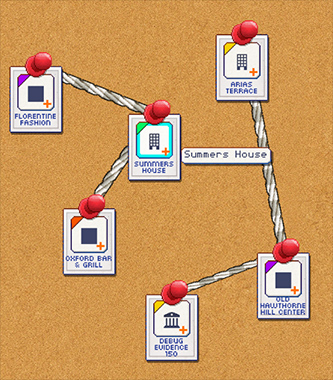 The slightly revamped corkboard interface features animated strings to show which way the 'incrimination' is flowing. The slightly revamped corkboard interface features animated strings to show which way the 'incrimination' is flowing.The corkboard itself is a familiar detective trope that everyone knows from movies and tv shows, and within the game has even more functionality. At the moment the corkboard also displays the core mechanic behind the game logic recognising incriminating evidence. Incrimination is passed along from one evidence item to another via connections (represented by the string). For example, the source of incrimination could be a dead body with a stab wound. The connection to where it was found (in this example lets say an apartment) will pass a sizable portion of that incrimination from the body along to it. From there you could discover that someone other than the victim lives in that apartment- again a portion of incrimination from the apartment is passed along to that person via the connection. This means the incrimination spans outward from the key evidence of the crime and is also visualized really well with the corkboard interface. Recently I've added animation to the strings so you can clearly see which way the incrimination is 'flowing'. String colours range from white to red the more incriminating a connection is. The strings also vary in width depending on how reliable a connection is. I'm focusing on these seemingly minor details now as they have a knock-on effect of streamlining how you play the game. Whenever I run a build, I don't know what's going to happen. The clearer the interface is, the easier it is to understand what's happening within the game. I've really been enjoying the UI work- next I hope to start moving onto some 3D stuff. Exciting! |
|
|
|
|
 Logged
Logged
|
|
|
|
bacon
Level 1


|
 |
« Reply #8 on: July 02, 2018, 07:47:40 PM » |
|
This looks and sounds so great! Sad to see not a ton of other posts in here because this idea is really interesting. I also really like the idea of scoping the generated city to have strict limits vs. infinite generation. It feels like that constraint could give you more to work with.
A few other questions:
Why worker placement? It seems weird for a digital game to leverage worker placement mechanics. I think it would make sense if you had a board game theme throughout, but the choice of skeuomorphism seems like it runs counter to the idea.
Have you played Sherlock Holmes: Consulting Detective? I feel like that game and this could share a lot of parallels in how you guide the player through a seemingly infinite play space. The key idea being that you make the player only feel like they should viist places that feel like natural next steps instead of feeling like they actually need to explore everything.
In a similar vein, how are you handling NPC "stories". Are you just generating some items with some meaning or are you simulating their whole life or...? Would love to know more about this! Does someone choose a life of crime young and then over time become your criminal?
In terms of exploring the city, I think you should hold off. It feels like that would make this a totally different game. I also think Bernband works because of how dense and narrow the game world is. A more apt comparison here could be something like Home Free, Sub Rosa, or Jalopy. The issue though is that I think the play space of my mind would imagine a really rich world, and unless you put the time in to render that, would just feel empty.
|
|
|
|
|
 Logged
Logged
|
|
|
|
|
Alec S.
|
 |
« Reply #9 on: July 02, 2018, 11:03:27 PM » |
|
This is a really cool and ambitious concept! Good luck, I'll be looking forward to seeing this develop!
|
|
|
|
|
 Logged
Logged
|
|
|
|
|
ColePowered
|
 |
« Reply #10 on: July 03, 2018, 01:24:51 AM » |
|
Thanks Bacon & Alec!  You raise some really good points Bacon, some I have answers to and some I don't but I'll try and explain my thoughts. Why worker placement? It seems weird for a digital game to leverage worker placement mechanics. I think it would make sense if you had a board game theme throughout, but the choice of skeuomorphism seems like it runs counter to the idea.
I've chosen to go for a fairly simplistic approach to managing your office. Maybe 'worker placement' conjures up the wrong idea, it's more of an FTL-esque system. What I want to avoid is having any micro-management interfere with the decision making processes involving the cases, as I think that could get really annoying for the player (eg. I've just found out where the killer lives and I'm organising a raid operation, but wait my receptionist wants a new printer!) So any time-sensitive micro-management is out, and it's more about set-and-forget and non time-sensitive management. Have you played Sherlock Holmes: Consulting Detective? I feel like that game and this could share a lot of parallels in how you guide the player through a seemingly infinite play space. The key idea being that you make the player only feel like they should viist places that feel like natural next steps instead of feeling like they actually need to explore everything.
I've played Consulting detective- I love it, and it's partly an inspiration for this game. As you say, the biggest similarity is that 'What's the next step?' Question you are confronted with. If anything the open-ended design aids that to some extent. In Consulting Detective I can't question the neighbors if they're not an option in the book, but in this I can. So to some extent guiding the player may end up being easier because there are more natural 'next step' options available. What I need to be really careful about is expecting that same kind of intricate story detail- because it's not going to happen through proc gen. I can give all the citizens intricate backstories, but I can't simulate the level of social interaction needed to generate something as compelling as one of the pre-written scenarios in Consulting Detective. This in part is why the game is supplemented with that management aspect-- to give motivation and progression beyond solving the cases. In a similar vein, how are you handling NPC "stories". Are you just generating some items with some meaning or are you simulating their whole life or...? Would love to know more about this! Does someone choose a life of crime young and then over time become your criminal?
I'll definitely write (a lot) more about the generation behind all the citizens. I'm using a basic psychological model to simulate their personalities called HEXACO, that uses 6 variables to explain someone's personality. I'm going to pair that with a few other psychological state variables (Trauma being one for example) to create a psychological profile for each citizen. I haven't ventured into creating backstories yet (those variables are random atm), but what I'm going to do is use past events as a kind of buff/debuff system for them. All citizen characteristics & decisions are based on those values- what kind of job they have, how open they are to questioning etc. So you will, to some degree, be able to find out why they are how they are. The game can use those variables to pick a killer. In terms of exploring the city, I think you should hold off. It feels like that would make this a totally different game. I also think Bernband works because of how dense and narrow the game world is. A more apt comparison here could be something like Home Free, Sub Rosa, or Jalopy. The issue though is that I think the play space of my mind would imagine a really rich world, and unless you put the time in to render that, would just feel empty.
From a game design perspective, I think you may be right about the exploring aspect. I agree that the game doesn't need it. However, if I'm being honest it's just an idea that I having a lot of fun thinking about implementing. Even if it's a bit of an odd/wrong thing to focus on, I'm finding that coding all the systems I've written about so far a bit exhausting! As of this week I've been toying around with some of the 3D voxel visuals and I'm having a lot of fun doing so. It's still early enough in development for a little pivoting, so I'm just happy to see where it takes me.  |
|
|
|
|
 Logged
Logged
|
|
|
|
bacon
Level 1


|
 |
« Reply #11 on: July 03, 2018, 05:05:20 AM » |
|
I've chosen to go for a fairly simplistic approach to managing your office. Maybe 'worker placement' conjures up the wrong idea, it's more of an FTL-esque system. What I want to avoid is having any micro-management interfere with the decision making processes involving the cases, as I think that could get really annoying for the player (eg. I've just found out where the killer lives and I'm organising a raid operation, but wait my receptionist wants a new printer!) So any time-sensitive micro-management is out, and it's more about set-and-forget and non time-sensitive management.
Ah okay this makes more sense. I think that could definitely be interesting then. I also think Cultist Simulator kind of gets at that idea of worker placement, but through a different lens. Could be interesting to look at as well. I've played Consulting detective- I love it, and it's partly an inspiration for this game. As you say, the biggest similarity is that 'What's the next step?' Question you are confronted with. If anything the open-ended design aids that to some extent. In Consulting Detective I can't question the neighbors if they're not an option in the book, but in this I can. So to some extent guiding the player may end up being easier because there are more natural 'next step' options available.
What I need to be really careful about is expecting that same kind of intricate story detail- because it's not going to happen through proc gen. I can give all the citizens intricate backstories, but I can't simulate the level of social interaction needed to generate something as compelling as one of the pre-written scenarios in Consulting Detective. This in part is why the game is supplemented with that management aspect-- to give motivation and progression beyond solving the cases.
Yeah part of this definitely feels like just managing the "head canon" of the player. Like you have a whole city, but how do you manage to make it feel interesting to be in. I definitely recommend reading this article by David Bordwell, which feels like it goes a bit into that. Excited to see how you manage it as well. I'll definitely write (a lot) more about the generation behind all the citizens. I'm using a basic psychological model to simulate their personalities called HEXACO, that uses 6 variables to explain someone's personality. I'm going to pair that with a few other psychological state variables (Trauma being one for example) to create a psychological profile for each citizen.
I haven't ventured into creating backstories yet (those variables are random atm), but what I'm going to do is use past events as a kind of buff/debuff system for them. All citizen characteristics & decisions are based on those values- what kind of job they have, how open they are to questioning etc. So you will, to some degree, be able to find out why they are how they are. The game can use those variables to pick a killer.
This sounds interesting and looking forward to hearing more! From a game design perspective, I think you may be right about the exploring aspect. I agree that the game doesn't need it. However, if I'm being honest it's just an idea that I having a lot of fun thinking about implementing. Even if it's a bit of an odd/wrong thing to focus on, I'm finding that coding all the systems I've written about so far a bit exhausting! As of this week I've been toying around with some of the 3D voxel visuals and I'm having a lot of fun doing so. It's still early enough in development for a little pivoting, so I'm just happy to see where it takes me.  Pivot away!I'm also just excited for the base thing as well  |
|
|
|
|
 Logged
Logged
|
|
|
|
|
ColePowered
|
 |
« Reply #12 on: July 03, 2018, 06:07:45 AM » |
|
Thanks for the tips  |
|
|
|
|
 Logged
Logged
|
|
|
|
|
ColePowered
|
 |
« Reply #13 on: July 21, 2018, 09:57:39 AM » |
|
Sometimes you can judge how hard I'm working on the game by lack of my blog updates, it's fair to say that's been true recently. I'm rallying to get something presentable and playable to some extent by late summer. It's always been my personal game dev philosophy that I'd rather make games that are too ambitious for their own good, rather than under-ambitious. This project is not an exception. Despite my enthusiasm, however, so far the 'game' part has always seemed off. I love a good management game, but I guess a big reason why detective games and management games haven't crossed paths before (to my knowledge) is that... Well, it's pretty fun for the player to do the detective work, not leave it to a team of minions! The game needed an injection of excitement in order for me to clarify where my ideas were heading... In the last update, I mentioned about putting a first person controller inside the 3D city that I've constructed, just to get a sense of what it would be like to explore the city from street level. Although my original idea for the game certainly didn't require that, part of what makes development fun for me is trying out those ideas. It's been a huge amount of work to create this simulated city and population, and I thought it a shame that you can't really feel 'among' it with a top-down camera perspective. I only really started with the overhead perspective because it's typically part of the management game genre. Often the reason for that is because the player is required to build things-- that's not the case here, so it seemed ripe for experimentation. 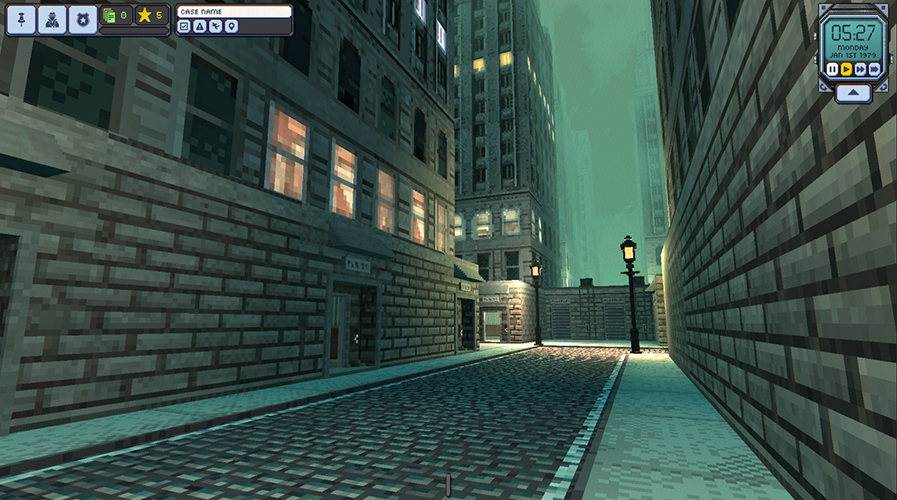 Shadows of Doubt: A first-person detective sim! Shadows of Doubt: A first-person detective sim!This is about the latest in the project I can comfortably change something as fundamental as this without having to remake a lot of things. The first person perspective is more of an addition than a change. I still want to keep the framework that I've made involving the procedural cases, population etc and even most of the management aspects. You can still pause the game at any time and interact with all the case files, as I've shown previously. The key difference being the player is now the detective. You'll still need your team of professionals to complement you- (eg forensics experts, ordering DNA tests, autopsies etc). But you'll be visiting the crime scenes, questioning and pursuing suspects yourself and generally being more a part of the world in addition to having that slightly lighter management role. 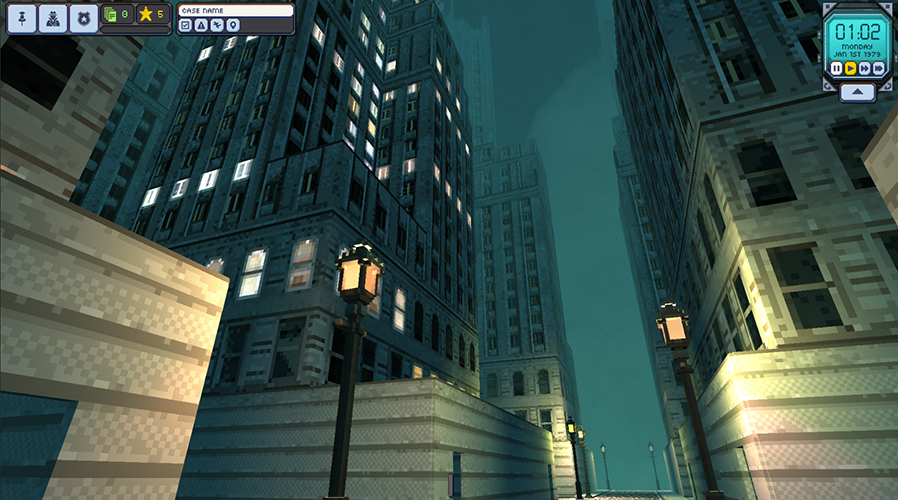 Those building lights aren't at all random; it actually means the light has been turned on in that room (meaning likely someone is home). Those building lights aren't at all random; it actually means the light has been turned on in that room (meaning likely someone is home).This, of course, is a lot more work on my plate. As a bit of a visuals enthusiast though, I'm having a lot of fun making some of the early assets. I've chosen to go for a hybrid of pixel art and voxels to make the creation process relatively easy. I'm loving working with voxels- it's like working with Lego. I have a huge catalogue of building models from Concrete Jungle which I can adapt and 'voxelize'- it's saving me a decent chunk of time and because the art style is so different it doesn't feel like a cheat. 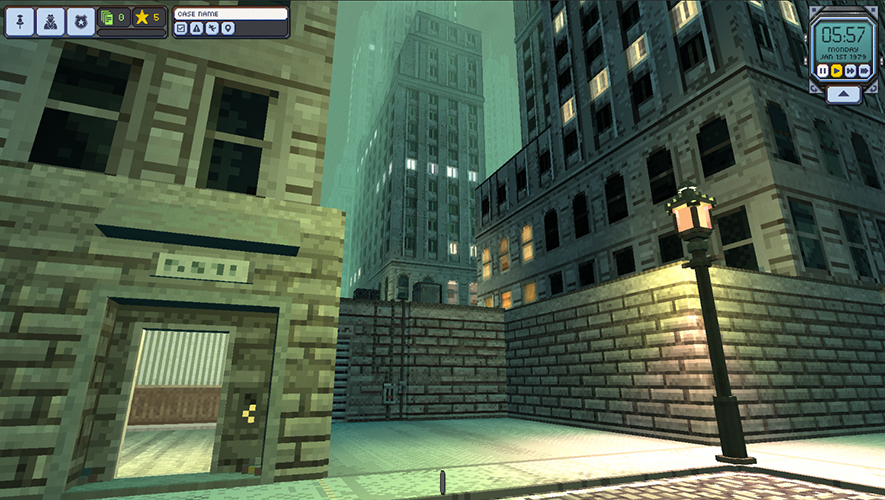 I'm pleased with the first building model in the game. Doors aren't a thing yet though! I'm pleased with the first building model in the game. Doors aren't a thing yet though!Because of my 'everything-is-simulated' approach, the procedural generation means shadow baking is unavailable to me. The lighting is going to be a bit primitive as a result, but luckily this works fine with my low-fidelity art style. It also means all the interiors have to exist in some state-- when I've got skyscrapers with 20+ floors, this is a challenge. This is my custom-built floor editor. As you may be able to deduce, buildings floors are planned using a 5x5 grid. I need to keep these aspects of the game as simple as possible, as the game needs to handle a lot of pathfinding to simulate the citizens. I can designate zoning to each room (for example street-facing ground floor rooms may be retail/shops, floors above may contain residential apartments). The game will populate these rooms with businesses or apartments as appropriate when the city is generated in a similar way to SimCity. The different occupant types are also contained within presets (Unity scriptable objects). I can use different floor presets to generate buildings that are different from each other internally, while keeping my workload manageable. It's all about those nested presets! Interior decor will be a whole other layer to this, but that's not so important right now. I'm really excited to show more as the game progresses! |
|
|
|
« Last Edit: July 21, 2018, 10:14:54 AM by ColePowered »
|
 Logged
Logged
|
|
|
|
|
Alec S.
|
 |
« Reply #14 on: July 21, 2018, 10:06:26 AM » |
|
Saw those screenshots on twitter earlier. Looking absolutely fantastic!
|
|
|
|
|
 Logged
Logged
|
|
|
|
|
ColePowered
|
 |
« Reply #15 on: July 24, 2018, 09:08:20 AM » |
|
Thanks Alec! I've been working on stairwells today. Wooooaaahhh! 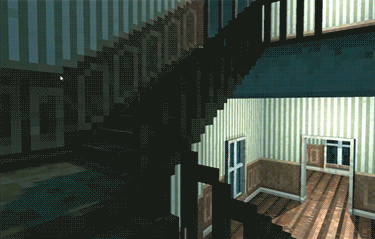 |
|
|
|
|
 Logged
Logged
|
|
|
|
|
ColePowered
|
 |
« Reply #16 on: July 30, 2018, 09:36:56 AM » |
|
This week has been hugely productive-- following on from last week, I've implemented basic interiors so you can now go inside every building (complete with stairwells). That's not to say interiors are anything like complete- there's no furnishings, doors, or really anything of note, just rooms decorated in a sickly green striped wallpaper. However, the rooms even existing in 3D space is a nice milestone. I've had to start thinking about the culling techniques for the game, as the game can't possibly render every single room in every single building across the entire city at once. I've been able to appropriate my pathfinding/grid system to help me here, as interior space configurations are massively simplified by being on an internal 5x5 grid system, it's able to help the engine know what to render and what to skip. The streets are rendered from inside a building, so you can see out the windows, but not vice versa. The only exception to this rule is the ground floor, which is rendered at street level, so it's possible to have things like shop storefront windows which you can see into and out of. I'm happy with this compromise as it's generally pretty tough to see into a window above the ground floor if you're in the street. 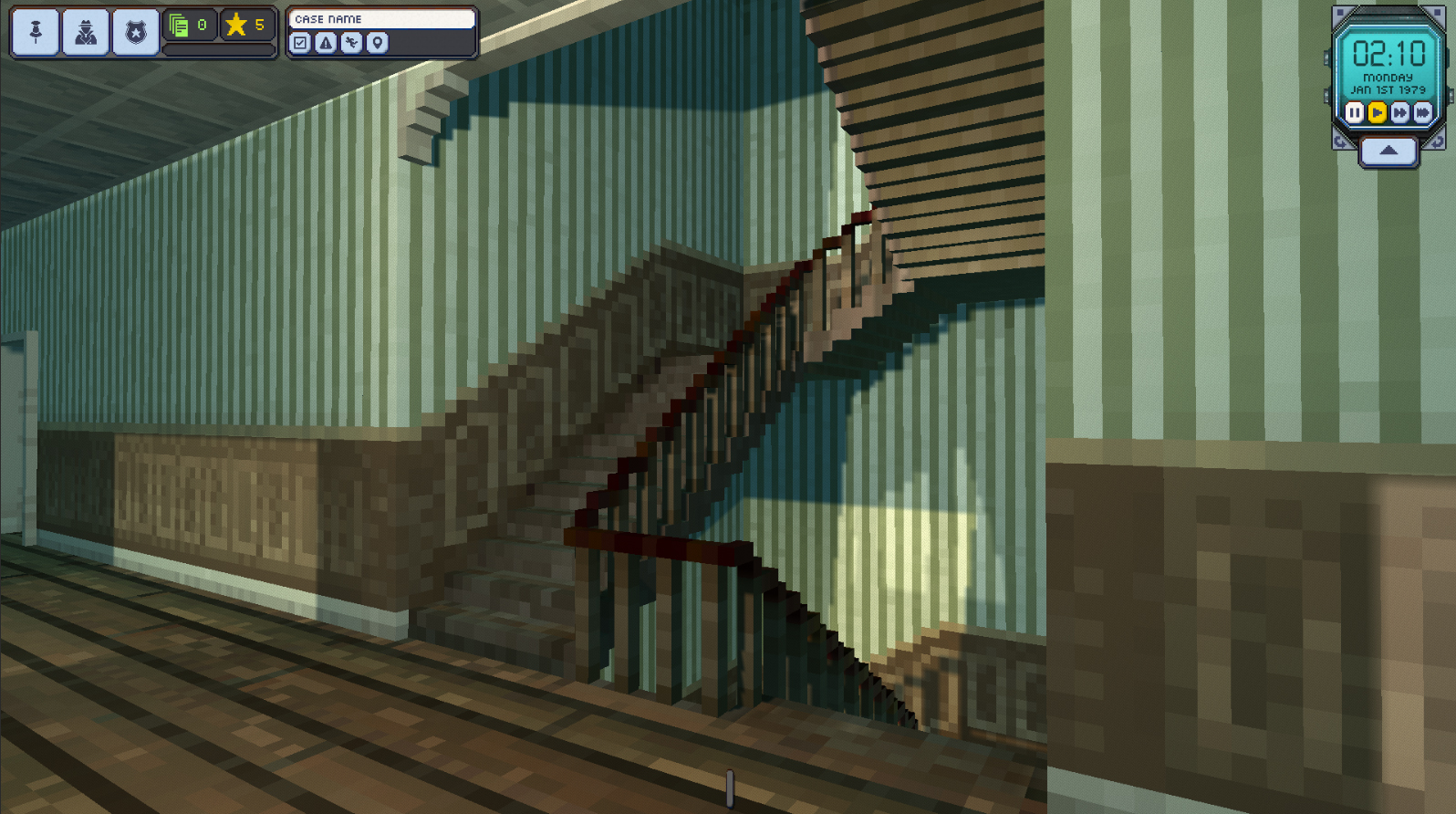 I love the effect of the voxels creating such harsh shadows in the stairwells. It fits the noir theme perfectly! I love the effect of the voxels creating such harsh shadows in the stairwells. It fits the noir theme perfectly!After my graphical production spree, I've now settled back into coding the gameplay. The main reason for this is to get something at least semi-playable I can demo pretty soon. I'm finding the pieces are finally fitting together a little more. The complete simulation of detective cases gels well with the player being an active character in the world. For example; don't want to spend several in-game hours dusting the crime scene for prints? No problem- just leave it to your other detectives while you track down a lead. You might, want to question the prime suspect, but also canvass all of the neighbours to leave no stone unturned- again, not a problem, just leave the boring stuff to your minions! If there's nothing for your other detectives to do, that's not a problem either- they'll sit back at the office and generate 'paperwork', which is a resource you need to unlock various orders (for example obtaining a search warrant). Essentially it's going to be a first-person detective game which allows the player to focus on the more interesting side of detective work. It's also going to be possible to do the opposite and be the one sitting back at the office, passively generating the paperwork resource, while you simply order your detective teams to do everything. I'm going to draw a line at combat though. Stealth, sneaking about and tailing suspects are definitely on the cards, but combat not so much. If I do ever decide to explore it, it would be a minor part of the game, so just to reiterate- this isn't a shooter. One decision I'm stuck on is what to do with the old default view; the isometric camera. As you can see below, the game looks great from this view, but sadly I cannot find much of a practical use for it. Currently, it's been taken out- the first person camera being essential for exploring, while the top-down camera is better for navigation and a general overview of the city. You can switch between them seamlessly with the F key. What the top-down camera can't do, however, is differentiate between different floors in a building. This could be where the isometric camera is useful.  The isometric view: Pretty but not practical for anything right now! The isometric view: Pretty but not practical for anything right now!Lastly, with the focus now back on gameplay, I've been working on a first-person object interaction system. I've taken some inspiration from the original Deus Ex and System Shock here, as I'm sure anyone familiar with them will no doubt recognize. Maybe it's my own nostalgia, but in my opinion, it remains the clearest graphical way to interact with the game world. Not having a first-person weapon to design around frees up both mouse buttons to become available for world interaction- I've not quite figured out the rules for this yet, but it gives me some freedom in that respect. In the week ahead I'll be continuing to evolve the gameplay. My first gameplay milestone involves having the AI killer murder someone, have the crime be reported, and then for the player to be able to visit the crime scene and find various bits of evidence. |
|
|
|
|
 Logged
Logged
|
|
|
|
|
Christian Knudsen
|
 |
« Reply #17 on: July 31, 2018, 03:39:06 AM » |
|
Why am I hearing the Dark City soundtrack playing in my head?!?! (This all looks awesome!) |
|
|
|
|
 Logged
Logged
|
|
|
|
|
Zireael
|
 |
« Reply #18 on: July 31, 2018, 04:42:25 AM » |
|
I really like the art, both the UI and the 3d buildings. Are the textures taken from your earlier project too, or did you make them anew?
|
|
|
|
|
 Logged
Logged
|
|
|
|
|
ColePowered
|
 |
« Reply #19 on: July 31, 2018, 05:41:22 AM » |
|
Why am I hearing the Dark City soundtrack playing in my head?!?!
(This all looks awesome!)
Thanks! Dark City is a major influence over the atmosphere I'm going for.  I really like the art, both the UI and the 3d buildings. Are the textures taken from your earlier project too, or did you make them anew?
Cheers- at the moment the one building you can see above has it's texture from Concrete Jungle, although it's been altered quite significantly from the voxelization process. Here's the same building from Concrete Jungle (this is processed quite heavily in Photoshop as all that was needed was a 2D image): 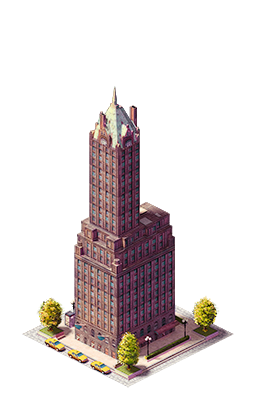 |
|
|
|
|
 Logged
Logged
|
|
|
|
|
 Community
Community DevLogs
DevLogs Shadows of Doubt - A First-Person Detective Stealth Game
Shadows of Doubt - A First-Person Detective Stealth Game Community
Community DevLogs
DevLogs Shadows of Doubt - A First-Person Detective Stealth Game
Shadows of Doubt - A First-Person Detective Stealth Game
